Memo to studios and streamers: Do you want Charles Shyer, the creative force behind such massive hits as “The Parent Trap” (which he co-wrote) and “Father of the Bride” (which he directed and co-wrote), to direct a movie for you? Let him do it his way, and you’ll be just fine.
After almost 20 years out of the directing game (his previous film was the Jude Law-starring “Alfie” remake in 2004), Shyer returns to the kind of feel-good filmmaking he made his signature, thanks to his early films, like the aforementioned hits and even “Baby Boom,” all co-written with his ex-wife, fellow comedy queen Nancy Meyers. (And, never fear, it sounds like the ex-spouses still get along swimmingly, as you’ll see in the following interview.) This time, there is something different: The former studio mainstay has alighted for Netflix.
Shyer’s return to filmmaking bears the usual hallmarks: good-natured comedy, lots of family stuff, a sweet romance, and all in a holiday setting to boot. The film is “The Noel Diary,” based on the Richard Paul Evans bestseller of the same name. Starring Justin Hartley as a successful author who needs to return home during Christmas to sew up the final affairs of his recently passed mother, the film is a good-natured holiday trifle. Really, the kind of thing Shyer excels at, and that the studios just aren’t making anymore.
Ahead, Shyer opens up about his return to filmmaking, what the studios are getting wrong, the key to comedy, and some frankly illuminating ruminations on sequel madness and the legacy of his “Private Benjamin.”
The following interview has been edited and condensed for clarity.
IndieWire: When I see a director of your stature doing a movie for Netflix, my question is always, how did Netflix lure you?
Charles Shyer: They’d actually offered me other movies, but I had this desire to do a Christmas movie. I don’t know why, I like Christmas a lot, but it’s the same reason that Nancy and I did “The Parent Trap”: We wanted to do a kids’ movie. You have this dream that maybe you’ll do a perennial, and I thought maybe that’s what this could be.
There was a script that was already written, but it wasn’t really the kind of movie I wanted to make. So I went in and I gave them my notes, and they were just really on board with everything. I got everybody I wanted in the cast. Justin was my first choice. Barrett, actually I didn’t know, but I did read a bunch of people, and she was the only one I really wanted. And then Bonnie and James and Essence Atkins.
It was just a really positive experience for me, and the movie was fraught with a lot of problems. We started in Vancouver. We prepped the whole movie. But we had locations, we had crew, we started casting, and then COVID hit, and we were kicked out of Vancouver, and we had to go all the way to Connecticut and start all fucking over again. We landed, by the way, in July in the middle of a heat wave, so it was like 100 degrees or something like that. The crew is in shorts and t-shirts, and the poor actors are all bundled up and stuff. But we persevered.
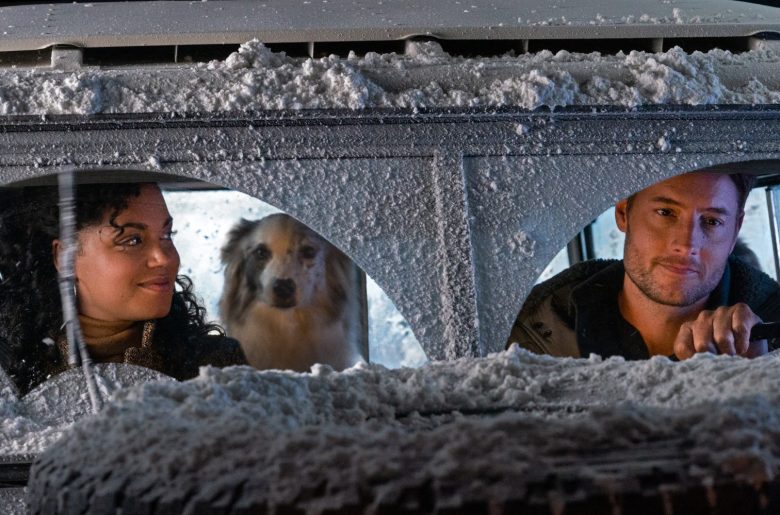
“The Noel Diary”
KC Bailey/Netflix
For a long time, it seemed like Netflix was the only joint interested in making romances and rom-coms. As someone who had success making them for studios and has now turned to the streaming side, why do you think romances continue to perform for streamers?
The obvious answer, is people want to see them. The Hallmark movies are really cliche-ridden romances, especially the Christmas movies: The woman’s coming out of the store holding a bunch of stuff, and she bumps into the cute guy and drops everything. He helps her pick them up, and they fall in love. So to do a movie [like this] that has substance is really a joy.
But if you’re doing a job that [the people at Netflix] support or they like what you’re doing and you stay within budget and stuff, they’re just really good, really good. Also the publicity and the advertising people. At studios, a lot of times you get the geniuses who are “creatives.” I had this a lot of times [at studios], when you’re doing the one-sheet or the trailer or whatever it is, that you have to battle to get what you want. That’s not the case at Netflix. They have ideas, but they’re totally collaborative.
At what point did you start noticing, “Hey, the studios aren’t really making the kind of films that I like to make or that I’ve made in the past”?
I was prepping a movie for a year and a half called “Eloise in Paris,” based on the Eloise books. The budget was restrictive. But what happened was the company, after we did all this prep, went out of business. It was George Harrison’s company, HandMade Films. When that happened, it was a wake-up call to me: “Oh, shit. What’s going to happen now?”
It’s scary out there. I have four kids, including a 16-year-old son, and I worry because he wants to be a filmmaker. I think, “Fuck, man. It’s not like it was when I started out, which was a much easier road.” It was always hard, and you always had to have talent or some kind of commercial viability. But I worry, it’s so narrow now, the road to success.
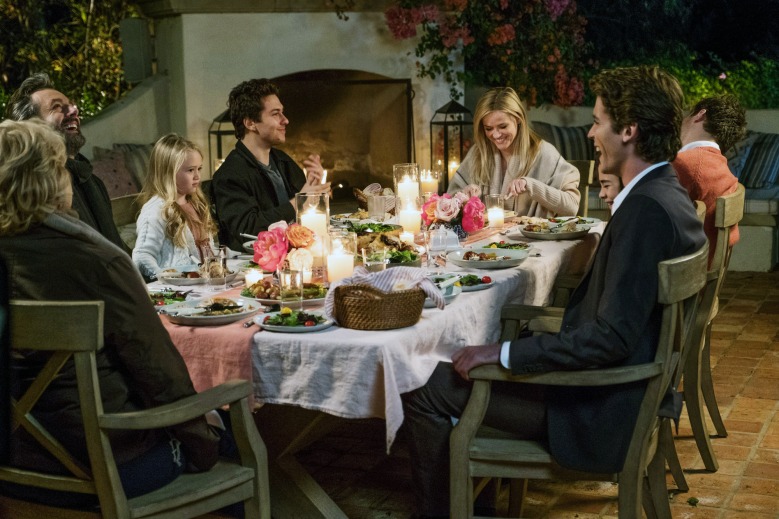
“Home Again”
Everett Collection / Everett Collection
One of your other children is already a filmmaker, too. Your daughter made “Home Again.” When Hallie [Meyers-Shyer] came to you and said, “I want to be a filmmaker,” what was that conversation like?
Nancy and I used to watch a lot of movies on TV. We’d watch Preston Sturges, Frank Capra, Ernst Lubitsch, and Alfred Hitchcock, and Hallie just gravitated to watching the movies with us. I remember once, we were watching a movie, and I forget what movie it was, but she said, watching the movie — and this is a seven or eight-year-old — “That’s a Bernard Herman score.” And you go, “How does she know that?” because we didn’t.
She was a really good writer in high school and just excelled. I knew, and I think Nancy too, just reading the stuff she wrote. When she applied for USC, she had to write a scene to be accepted into the screenwriting program, and I just could tell, she’s funny, and she’s smart, and she’s got it. Then, of course, she went on, and now she’s got a new movie happening with Michael Keaton. She just had the goods, and that’s hard to define sometimes, but it was very natural for her.
One thing you do in “The Noel Diary,” that I think rom-com fans will love is, you wink at the old tropes. “Oh, we only have one bed,” that sort of thing. What is the thought process behind including that stuff?
It was basically the irony because we wanted to end up getting them together. So if you take it back, how do you get to that point with a little humor and hopefully a little inventiveness? How do you get them in the same room? So play into it. You’re right, play into the trope, and then it’s on your side.
My big thing with movies, and with this one it was a major big thing, is I hate being corny. I just hate it. I figured, if you play right into it and you’re obvious about it, you take the curse off of the trope, as it were.
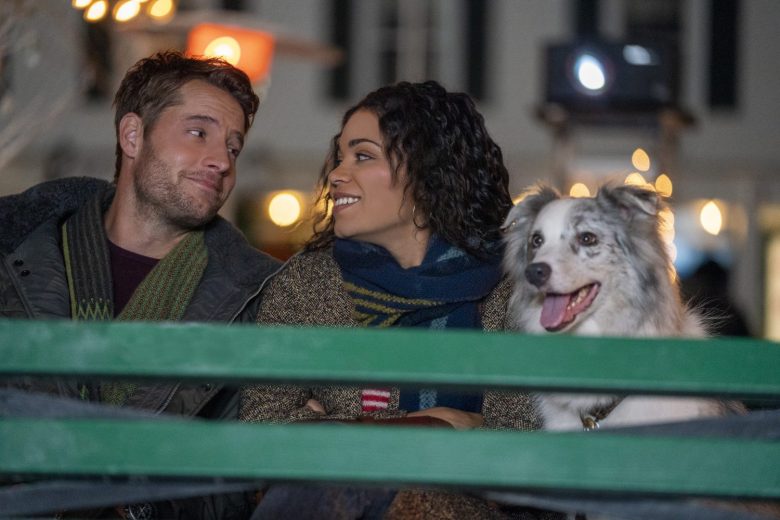
“The Noel Diary”
KC Bailey/Netflix
Why do you still love making these kinds of films?
I just gravitated towards stuff I like. I’ve never seen a James Bond movie. I’ve never seen one. I never liked science-fiction movies. But growing up, I loved Westerns. And then also, I co-wrote “Smokey and the Bandit,” which I guess is a real action movie. So I don’t know, you just write what you feel.
I like movies about people, and I want them to have substance of some sort. I have two more movies that I’m working on: one of them is a relationship movie, and the other is a kind of autobiographical movie about me when I was 17.
I’ve been working on this movie for 30 years or something. With the pandemic, when you’re sitting around with nothing to do and nowhere to go, you have to look inside. And I thought, “Shit, maybe this is the time.” I think I always had the first act worked out in my mind, but I just said, “Fuck, I’m just going to write this off the top of my head.” And then I did a draft that was very long, and then started cutting it down.
When I was 17, I contracted a disease that put me in the hospital for 17 months, and it was a county hospital. The script is a combination of “400 Blows” and “One Flew Over the Cuckoo’s Nest,” and it really happened to me. It’s a hard movie to get made, but I’m trying to make it.
Looking back over your films, these films have endured. People talk about “The Parent Trap” and “Father of the Bride” all the time. Is this a surprise to you? When you’re making a film, can you even think, “Oh, in 20 years, people are still going to care about this one”?
It never crossed my mind — or it never crosses my mind. You try to write things that are not basically of the moment, especially in comedy. Billy Wilder said, “Comedy is not like fine wine. It does not age well.” And so I guess you try to do movies that you don’t put in references that are of the moment. I think it was: not be corny, don’t be of the moment, and try to write stories about human beings that will reflect on today and tomorrow and yesterday.
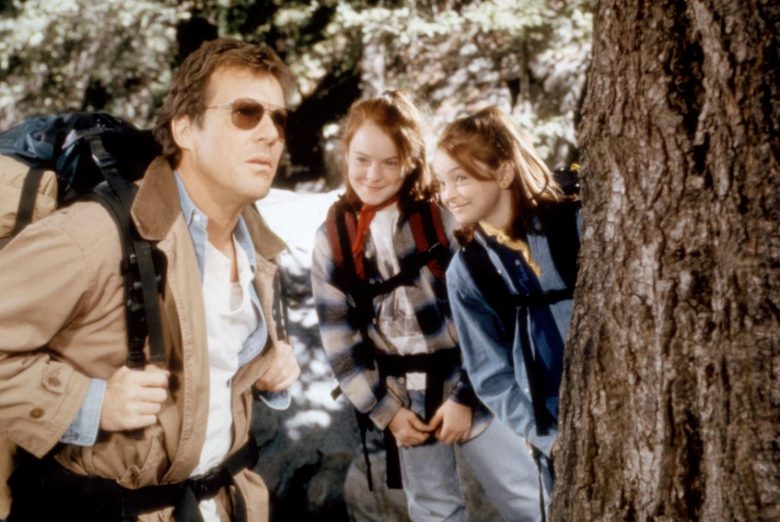
“The Parent Trap”
©Walt Disney Co./Courtesy Everett Collection
Hollywood seems to be more obsessed with remakes and sequels and “reimaginings” than ever before, and yet you had such great success with your remakes, from “Father of the Bride” to “The Parent Trap” and even “Alfie.” You’ve proven that they can still be successful.
We tried to put an original spin. We didn’t want to do a carbon copy of the original movies. We always wanted to have its own originality and stamp.
The other answer to your question is, I think, the reason there are so many remakes and stuff like that is because, in the executive suites, it’s a safer bet: “If it worked the first time, then can you blame me and fire me if it doesn’t work this time?” I think it’s playing it safe a lot of times. I mean, we didn’t think that way, but I mean, when they do five and six of the same movie, well, it’s weird.
Look, it is show business. They want to make money. I just would never want to be in that position. I would never want to be an executive and have that kind of pressure. It’s like William Goldman said, “Nobody knows anything.”
One of your first films was “Private Benjamin,” which you co-wrote with Nancy. As someone who’s caught back up on a lot of movies from that era, I have to ask: Were you mad when “Stripes” came out a year later and it had pretty much the exact same plot?
[Laughs] Well, no, because I thought “Stripes,” Ivan Reitman and Bill Murray, they went for a broader movie than we did.
First of all, “Private Benjamin” was turned down by every studio in Hollywood, even with Goldie [Hawn] attached as Benjamin. She was our executive producer. I remember we went to a meeting at Paramount after they read the script, and Mike Eisner was the president of the studio, and we sat in his office with Mike and [producer] Don Simpson. And Mike said to Goldie, “This is a mistake for you to make this movie. After creating this character on ‘Laugh-In,’ for you to hit a guy is just not a good career move.”
And God bless Don Simpson, who spoke up and said, “Mike, you’re 100 percent wrong on this one.” He said, “I think this movie’s a hit.” And Mike said, “Well, I think you’re wrong, Don.” I remember when it came out, I got a letter from Don Simpson, which I still have, and it says, “When we fuck up, we fuck up big.” Really, that movie worked. I mean, we got an Academy Award nomination. It was pretty spectacular times.
I know there’s been some chatter about the film being made into a new television series. Have you heard anything about that?
We were never involved. Nancy and I read about that in the trades, so I have no idea. Oh, I did hear one thing. [Laughs] Somebody was going to do it, and they said they had this great idea of making Private Benjamin twins.
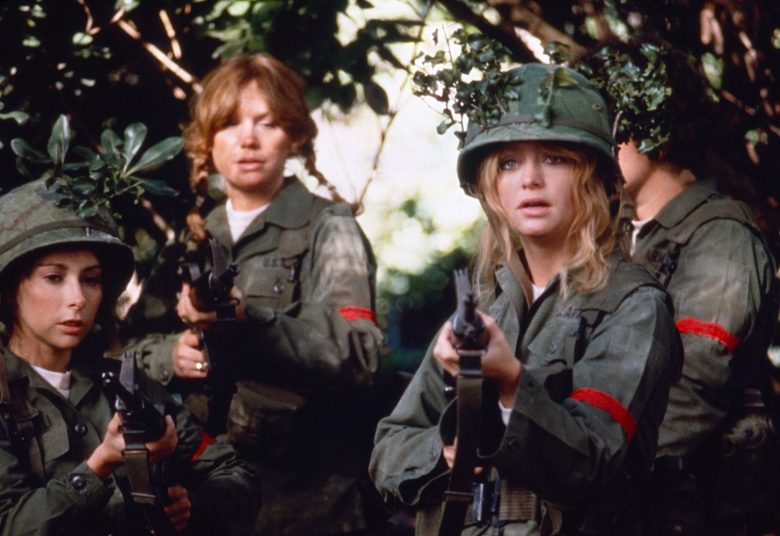
“Private Benjamin”
©Warner Bros/Courtesy Everett Collection
What?
It’s the kind of nonsense you hear that you go, “Well, what? What is the rationale? How is that going to be good?” It’s just so dumb that you look at people, are they on acid? I mean, what the fuck is that? Why? It’s just nonsense. And also, if you’re going to do it, try to make it at least as good as the original, and that can’t be. Like, “Parent Trap,” [twins] is relevant to the story. This has nothing to do with the story. It’s just stupid.
That all said, do you have any interest in going back to studio filmmaking?
Sure. I just don’t know. It’s just so hard to get movies made today. I’d go anywhere that will make a movie and leave me alone.
I’m a collaborator, by the way. I mean, I don’t mind ideas. When I’m making a movie, if the craft service person comes up to me and has an idea, I’ll say, “Great, brilliant.” And I’ll put it in, because I’m going to get the credit for it, co-written by the craft service person. So I’m very open to that. What you don’t want is obvious and dumb ideas, which come down the pike pretty regularly.
“The Noel Diary” is now streaming on Netflix.
After almost 20 years out of the directing game (his previous film was the Jude Law-starring “Alfie” remake in 2004), Shyer returns to the kind of feel-good filmmaking he made his signature, thanks to his early films, like the aforementioned hits and even “Baby Boom,” all co-written with his ex-wife, fellow comedy queen Nancy Meyers. (And, never fear, it sounds like the ex-spouses still get along swimmingly, as you’ll see in the following interview.) This time, there is something different: The former studio mainstay has alighted for Netflix.
Shyer’s return to filmmaking bears the usual hallmarks: good-natured comedy, lots of family stuff, a sweet romance, and all in a holiday setting to boot. The film is “The Noel Diary,” based on the Richard Paul Evans bestseller of the same name. Starring Justin Hartley as a successful author who needs to return home during Christmas to sew up the final affairs of his recently passed mother, the film is a good-natured holiday trifle. Really, the kind of thing Shyer excels at, and that the studios just aren’t making anymore.
Ahead, Shyer opens up about his return to filmmaking, what the studios are getting wrong, the key to comedy, and some frankly illuminating ruminations on sequel madness and the legacy of his “Private Benjamin.”
The following interview has been edited and condensed for clarity.
IndieWire: When I see a director of your stature doing a movie for Netflix, my question is always, how did Netflix lure you?
Charles Shyer: They’d actually offered me other movies, but I had this desire to do a Christmas movie. I don’t know why, I like Christmas a lot, but it’s the same reason that Nancy and I did “The Parent Trap”: We wanted to do a kids’ movie. You have this dream that maybe you’ll do a perennial, and I thought maybe that’s what this could be.
There was a script that was already written, but it wasn’t really the kind of movie I wanted to make. So I went in and I gave them my notes, and they were just really on board with everything. I got everybody I wanted in the cast. Justin was my first choice. Barrett, actually I didn’t know, but I did read a bunch of people, and she was the only one I really wanted. And then Bonnie and James and Essence Atkins.
It was just a really positive experience for me, and the movie was fraught with a lot of problems. We started in Vancouver. We prepped the whole movie. But we had locations, we had crew, we started casting, and then COVID hit, and we were kicked out of Vancouver, and we had to go all the way to Connecticut and start all fucking over again. We landed, by the way, in July in the middle of a heat wave, so it was like 100 degrees or something like that. The crew is in shorts and t-shirts, and the poor actors are all bundled up and stuff. But we persevered.

“The Noel Diary”
KC Bailey/Netflix
For a long time, it seemed like Netflix was the only joint interested in making romances and rom-coms. As someone who had success making them for studios and has now turned to the streaming side, why do you think romances continue to perform for streamers?
The obvious answer, is people want to see them. The Hallmark movies are really cliche-ridden romances, especially the Christmas movies: The woman’s coming out of the store holding a bunch of stuff, and she bumps into the cute guy and drops everything. He helps her pick them up, and they fall in love. So to do a movie [like this] that has substance is really a joy.
But if you’re doing a job that [the people at Netflix] support or they like what you’re doing and you stay within budget and stuff, they’re just really good, really good. Also the publicity and the advertising people. At studios, a lot of times you get the geniuses who are “creatives.” I had this a lot of times [at studios], when you’re doing the one-sheet or the trailer or whatever it is, that you have to battle to get what you want. That’s not the case at Netflix. They have ideas, but they’re totally collaborative.
At what point did you start noticing, “Hey, the studios aren’t really making the kind of films that I like to make or that I’ve made in the past”?
I was prepping a movie for a year and a half called “Eloise in Paris,” based on the Eloise books. The budget was restrictive. But what happened was the company, after we did all this prep, went out of business. It was George Harrison’s company, HandMade Films. When that happened, it was a wake-up call to me: “Oh, shit. What’s going to happen now?”
It’s scary out there. I have four kids, including a 16-year-old son, and I worry because he wants to be a filmmaker. I think, “Fuck, man. It’s not like it was when I started out, which was a much easier road.” It was always hard, and you always had to have talent or some kind of commercial viability. But I worry, it’s so narrow now, the road to success.

“Home Again”
Everett Collection / Everett Collection
One of your other children is already a filmmaker, too. Your daughter made “Home Again.” When Hallie [Meyers-Shyer] came to you and said, “I want to be a filmmaker,” what was that conversation like?
Nancy and I used to watch a lot of movies on TV. We’d watch Preston Sturges, Frank Capra, Ernst Lubitsch, and Alfred Hitchcock, and Hallie just gravitated to watching the movies with us. I remember once, we were watching a movie, and I forget what movie it was, but she said, watching the movie — and this is a seven or eight-year-old — “That’s a Bernard Herman score.” And you go, “How does she know that?” because we didn’t.
She was a really good writer in high school and just excelled. I knew, and I think Nancy too, just reading the stuff she wrote. When she applied for USC, she had to write a scene to be accepted into the screenwriting program, and I just could tell, she’s funny, and she’s smart, and she’s got it. Then, of course, she went on, and now she’s got a new movie happening with Michael Keaton. She just had the goods, and that’s hard to define sometimes, but it was very natural for her.
One thing you do in “The Noel Diary,” that I think rom-com fans will love is, you wink at the old tropes. “Oh, we only have one bed,” that sort of thing. What is the thought process behind including that stuff?
It was basically the irony because we wanted to end up getting them together. So if you take it back, how do you get to that point with a little humor and hopefully a little inventiveness? How do you get them in the same room? So play into it. You’re right, play into the trope, and then it’s on your side.
My big thing with movies, and with this one it was a major big thing, is I hate being corny. I just hate it. I figured, if you play right into it and you’re obvious about it, you take the curse off of the trope, as it were.

“The Noel Diary”
KC Bailey/Netflix
Why do you still love making these kinds of films?
I just gravitated towards stuff I like. I’ve never seen a James Bond movie. I’ve never seen one. I never liked science-fiction movies. But growing up, I loved Westerns. And then also, I co-wrote “Smokey and the Bandit,” which I guess is a real action movie. So I don’t know, you just write what you feel.
I like movies about people, and I want them to have substance of some sort. I have two more movies that I’m working on: one of them is a relationship movie, and the other is a kind of autobiographical movie about me when I was 17.
I’ve been working on this movie for 30 years or something. With the pandemic, when you’re sitting around with nothing to do and nowhere to go, you have to look inside. And I thought, “Shit, maybe this is the time.” I think I always had the first act worked out in my mind, but I just said, “Fuck, I’m just going to write this off the top of my head.” And then I did a draft that was very long, and then started cutting it down.
When I was 17, I contracted a disease that put me in the hospital for 17 months, and it was a county hospital. The script is a combination of “400 Blows” and “One Flew Over the Cuckoo’s Nest,” and it really happened to me. It’s a hard movie to get made, but I’m trying to make it.
Looking back over your films, these films have endured. People talk about “The Parent Trap” and “Father of the Bride” all the time. Is this a surprise to you? When you’re making a film, can you even think, “Oh, in 20 years, people are still going to care about this one”?
It never crossed my mind — or it never crosses my mind. You try to write things that are not basically of the moment, especially in comedy. Billy Wilder said, “Comedy is not like fine wine. It does not age well.” And so I guess you try to do movies that you don’t put in references that are of the moment. I think it was: not be corny, don’t be of the moment, and try to write stories about human beings that will reflect on today and tomorrow and yesterday.

“The Parent Trap”
©Walt Disney Co./Courtesy Everett Collection
Hollywood seems to be more obsessed with remakes and sequels and “reimaginings” than ever before, and yet you had such great success with your remakes, from “Father of the Bride” to “The Parent Trap” and even “Alfie.” You’ve proven that they can still be successful.
We tried to put an original spin. We didn’t want to do a carbon copy of the original movies. We always wanted to have its own originality and stamp.
The other answer to your question is, I think, the reason there are so many remakes and stuff like that is because, in the executive suites, it’s a safer bet: “If it worked the first time, then can you blame me and fire me if it doesn’t work this time?” I think it’s playing it safe a lot of times. I mean, we didn’t think that way, but I mean, when they do five and six of the same movie, well, it’s weird.
Look, it is show business. They want to make money. I just would never want to be in that position. I would never want to be an executive and have that kind of pressure. It’s like William Goldman said, “Nobody knows anything.”
One of your first films was “Private Benjamin,” which you co-wrote with Nancy. As someone who’s caught back up on a lot of movies from that era, I have to ask: Were you mad when “Stripes” came out a year later and it had pretty much the exact same plot?
[Laughs] Well, no, because I thought “Stripes,” Ivan Reitman and Bill Murray, they went for a broader movie than we did.
First of all, “Private Benjamin” was turned down by every studio in Hollywood, even with Goldie [Hawn] attached as Benjamin. She was our executive producer. I remember we went to a meeting at Paramount after they read the script, and Mike Eisner was the president of the studio, and we sat in his office with Mike and [producer] Don Simpson. And Mike said to Goldie, “This is a mistake for you to make this movie. After creating this character on ‘Laugh-In,’ for you to hit a guy is just not a good career move.”
And God bless Don Simpson, who spoke up and said, “Mike, you’re 100 percent wrong on this one.” He said, “I think this movie’s a hit.” And Mike said, “Well, I think you’re wrong, Don.” I remember when it came out, I got a letter from Don Simpson, which I still have, and it says, “When we fuck up, we fuck up big.” Really, that movie worked. I mean, we got an Academy Award nomination. It was pretty spectacular times.
I know there’s been some chatter about the film being made into a new television series. Have you heard anything about that?
We were never involved. Nancy and I read about that in the trades, so I have no idea. Oh, I did hear one thing. [Laughs] Somebody was going to do it, and they said they had this great idea of making Private Benjamin twins.

“Private Benjamin”
©Warner Bros/Courtesy Everett Collection
What?
It’s the kind of nonsense you hear that you go, “Well, what? What is the rationale? How is that going to be good?” It’s just so dumb that you look at people, are they on acid? I mean, what the fuck is that? Why? It’s just nonsense. And also, if you’re going to do it, try to make it at least as good as the original, and that can’t be. Like, “Parent Trap,” [twins] is relevant to the story. This has nothing to do with the story. It’s just stupid.
That all said, do you have any interest in going back to studio filmmaking?
Sure. I just don’t know. It’s just so hard to get movies made today. I’d go anywhere that will make a movie and leave me alone.
I’m a collaborator, by the way. I mean, I don’t mind ideas. When I’m making a movie, if the craft service person comes up to me and has an idea, I’ll say, “Great, brilliant.” And I’ll put it in, because I’m going to get the credit for it, co-written by the craft service person. So I’m very open to that. What you don’t want is obvious and dumb ideas, which come down the pike pretty regularly.
“The Noel Diary” is now streaming on Netflix.


